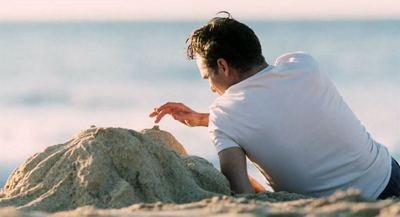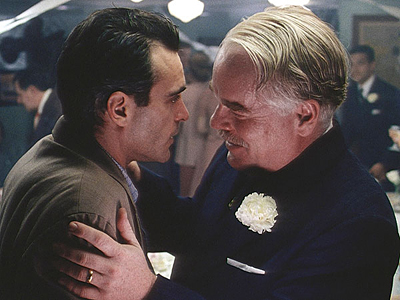The Master begins with Freddie Quell’s predicament. He is an alcoholic. The only sex he gets is with a sand woman his navy buddies sculpted on the beach. (He’s into it.) He stammers and stops short midsentence, and he has just finished his military service and doesn’t know what sort of job to get, where to live, or what to do. It’s a surprise when he’s hired as a department-store photographer, and it’s a surprise when another employee — a floor-walking coat model — is interested in him. It’s less surprising when he loses his job and bungles the romance. He gets a job on a farm, where his home-brewed alcohol kills a vegetable-picker. He runs. By the time he stows away on a private yacht, he is a man who is ripe for a master.
My mom was twenty-four when her two daughters (aged two and four) died in a fire. She moved back to Lake Charles, Louisiana, where friends and family members offered her their Valium. They encouraged her to go outside and take a dip in the pool. She tried a counselor. After a session, he gave her his professional opinion: she didn’t need him. Then he asked her out on a date. She tried a second psychologist, a woman who — on hearing the fire took place on a weekend — said, “Weekends are hard for you.” My mom hadn’t thought of that. In short, she was a woman who was ripe for a master.
What makes a person ripe for a master? Despair. And doubt, the first negative emotion a student of a master will confront.
The first time we see Lancaster Dodd (Phillip Seymour Hoffman), he is wearing a red silk robe brocaded with swastikas — a symbol of truth and a symbol of the darkest devastations ever inflicted by a charismatic leader who claimed to know truth. The red silk is the perfect distillation of the vertigo experienced by a student.
Lancaster Dodd meets Freddie at Freddie’s level. That is, he asks Freddie for a sip of his homemade booze, and he drinks it until it runs out of his mouth and down his shirt. Not long afterward, he asks Freddie if he would like some informal processing. The procedure is nonsensical, but it carries deep intuitive resonance:
“Say your name,” Lancaster says.
“Freddie Quell.”
“Say it again.”
“Freddie Quell.”
“Say it again.”
“Freddie Quell.”
“Might as well say it one more time just to make sure you know who you are . . .”
At first Freddie lies. Asked if past failures bother him, he says no. Dodd repeats the question twice, and Freddie says they might. Freddie starts to flirt with the truth, then he makes a joke — he mocks the session. Unperturbed, Dodd says the session is over. Freddie asks him to start again. “This is fun. No one’s asked me questions before . . .”
In the next session, he is unflinching and honest.
“Have you ever had intercourse with a member of your family.”
“Yes.”
“Have you ever had intercourse with a member of your family.”
“Yes.”
Freddie stowed away on a strange yacht; my mother met a man named Jim. Jim was good-looking. He had thick brown hair and a mustache, and he stood up straight, with good head and shoulders, like the leader of a clan receiving a guest in an old Japanese movie. He spoke easily, often offending people, and yet he seemed to have a good heart. My mom tried her trick on him. That is, she started to tell him about her dead children. Usually she could disarm and scare anyone that way. But Jim was unperturbed. He said, “Well, don’t let it ruin your life.” Another time she tried the trick and he said, “You and I both know you love your little tragedy.”
Of course it wasn’t a trick. Of course it was. Of course she didn’t love her tragedy. Of course she did. Of course she wanted to be seen by someone, particularly by a man she loved, and of course, once he let her show herself to him completely, she became hopelessly devoted.
He introduced her to his master, Chogyam Trungpa Rinpoche, a lama who had escaped Tibet overland, on foot, after the Chinese invasion. Trungpa was a drunk. Once he kept an auditorium of his students waiting for hours. He had to be carried onstage by two men, then drew himself up and said with perfect diction, “The problem is you think this is a business transaction. The relationship between master and student is not a business transaction. It is a love affair.”
It is this love affair that Paul Thomas Anderson is showing, and he understands it well, up until the point when dramatic necessity (the third act) forces him to draw a conclusion. With no real motivation, Freddie leaves Dodd to see Doris, the woman he had once loved but was unprepared to marry because of her age (sixteen) and his circumstances (he was about to join the navy, and he had sexual problems after sleeping with his Aunt Bertha). While this action makes sense outside of the master–student relationship, it doesn’t really make much sense within it.
What I mean is, Freddie is not given significant motivation to leave Dodd. From a secular perspective, we’d like to see Freddie free of Dodd and making love to a girl (which is what he does in the end), but for him to do that, he would need a reason to leave Dodd, and the doubt he begins to feel about Dodd’s authenticity isn’t enough. The kind of bond that exists between them would sustain doubt. It is difficult to explain this to a person who doesn’t have, or need, a guru. Think of it like this: a man and a woman are completely in love. Over a period of time, the man starts to receive subtle intimations that the woman is being unfaithful to him. The indications are unspoken — a glance or an expression — but his doubts grow. Then he hears something that seems, to him, to confirm his fears: she has been unfaithful. Would it be plausible if he just walked away? For Freddie to take off so quickly to Doris would have required something more base — if Dodd got a new student and started to ignore Freddie, for example. There are a million possibilities.
My mom still talks about my two sisters who died in the fire. And she still has a master.
















































































































